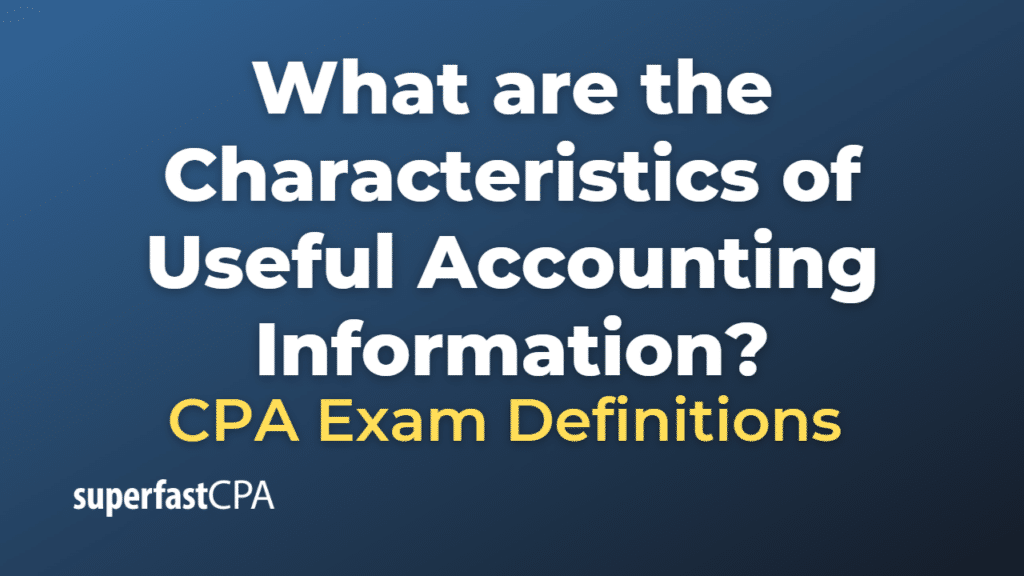Characteristics of Useful Accounting Information
Accounting information is crucial for decision-making by various stakeholders, including management, investors, creditors, and regulators. For accounting information to be useful, it should possess certain characteristics that make it relevant and reliable. The Financial Accounting Standards Board (FASB) and the International Accounting Standards Board (IASB) have identified several qualitative characteristics of useful accounting information:
- Relevance: Relevant accounting information is capable of making a difference in decision-making by helping users evaluate past, present, or future events, or by confirming or correcting their previous assessments. Relevant information should possess the following attributes:a. Predictive value: Information that helps users form expectations about future events or outcomes. b. Confirmatory value: Information that confirms or changes users’ past evaluations or assessments. c. Materiality: Information that is material if its omission or misstatement could influence the decisions of users.
- Faithful representation: Faithful representation implies that the accounting information accurately reflects the economic substance of business transactions and events. Faithful representation includes:a. Completeness: All necessary information is provided, and nothing significant is omitted. b. Neutrality: Information is free from bias and is not intended to favor one party over another. c. Free from error: Information is as accurate as possible, with no material errors or omissions.
- Comparability: Accounting information should be comparable, which means it can be used to identify similarities and differences between different entities or across different time periods. Consistent application of accounting principles and policies enables users to make meaningful comparisons.
- Verifiability: Verifiable accounting information means that different knowledgeable and independent observers would reach a consensus that the information is a faithful representation of the economic events it represents. Verifiability helps to ensure that the information is reliable and credible.
- Timeliness: Timely information is available to users before it loses its relevance for decision-making. Delays in reporting accounting information can reduce its usefulness and may lead to users making decisions based on outdated information.
- Understandability: Accounting information should be presented in a clear and concise manner so that users with a reasonable knowledge of business and economic activities can comprehend its meaning. Complexity should be minimized, and the information should be organized and presented in a way that facilitates understanding.
These characteristics of useful accounting information are essential in providing decision-makers with the necessary insights to make informed choices about the allocation of resources, the assessment of an entity’s performance, and the evaluation of financial risks and opportunities.
Example of the Characteristics of Useful Accounting Information
Let’s consider a hypothetical example involving a company’s financial statements to illustrate the characteristics of useful accounting information:
XYZ Corporation is a publicly-traded company that manufactures electronic gadgets. It prepares and presents financial statements to its stakeholders, including investors, creditors, and regulators. The financial statements include the balance sheet, income statement, statement of cash flows, and statement of stockholders’ equity, along with accompanying notes.
- Relevance:
- Predictive value: XYZ Corporation’s financial statements provide information on its revenue growth, profitability, and liquidity, helping investors predict future performance and make investment decisions.
- Confirmatory value: The financial statements confirm the company’s financial position and performance, allowing stakeholders to assess the effectiveness of management and the company’s overall health.
- Materiality: XYZ Corporation discloses all material information, such as significant contracts, contingent liabilities, and changes in accounting policies, ensuring that stakeholders have a complete picture of the company’s financial situation.
- Faithful representation:
- Completeness: The financial statements include all necessary disclosures and explanations, providing a comprehensive understanding of XYZ Corporation’s financial position and performance.
- Neutrality: The financial statements are prepared objectively, without bias, presenting both positive and negative aspects of the company’s financial performance.
- Free from error: The financial statements are prepared using accurate data and calculations, minimizing the risk of errors and misstatements.
- Comparability: XYZ Corporation follows Generally Accepted Accounting Principles (GAAP) and consistently applies its accounting policies, allowing stakeholders to compare its financial statements with those of other companies in the industry and evaluate its performance over different periods.
- Verifiability: Independent auditors review and verify XYZ Corporation’s financial statements, ensuring that they are a faithful representation of the company’s financial position and performance. The auditors’ opinion is included in the annual report, providing credibility to the financial information.
- Timeliness: XYZ Corporation publishes its financial statements promptly at the end of each reporting period, ensuring that stakeholders have access to up-to-date information for their decision-making.
- Understandability: The financial statements are presented in a clear and concise manner, with the use of headings, subtotals, and notes to provide additional explanations and context. This format allows users with a reasonable knowledge of business and economic activities to comprehend the information.
In this example, XYZ Corporation’s financial statements possess the characteristics of useful accounting information, providing relevant, faithfully represented, comparable, verifiable, timely, and understandable information to its stakeholders. This enables them to make informed decisions about investing, extending credit, or assessing the company’s financial performance and prospects.













